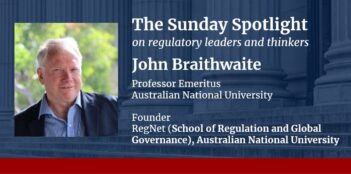
Scholar argues that criminal supervision alternatives to incarceration too often lead to family separation.
Should someone convicted of public urination be prohibited from seeing their children?
In a recent article, Alexis Karteron of Rutgers Law School argues that many states have answered this question in the affirmative. Although family separation may come up most often in the context of immigration, it also functions as a cornerstone of the U.S. criminal legal system through conditions on parolees that prevent them from seeing family members, Karteron states.
Karteron argues that when parole conditions implicate familial relationships, courts must do a better job of balancing individual and governmental interests rather than deferring to supervision authorities.
In the United States, more than four million people live under the supervision of probation, parole, and early supervised release programs. Karteron observes that states began to rely on these various “community supervision” programs in response to activism against mass incarceration. Some states view supervision programs as viable alternatives to incarceration because the programs allow people to stay in their communities.
But Karteron contends that this view overlooks the harsh conditions that many states impose on supervisees. She disagrees with the underlying assumption that, just because the supervisee is not behind bars, community supervision is always a preferable alternative to incarceration.
Karteron explains that supervision programs often limit parolees’ associations with people who have been or are incarcerated—including family members. Other restrictions can prevent parolees convicted of sex offenses from contact with children, sometimes separating them from their own children long after their incarceration has ended.
Supervision conditions, Karteron notes, are often so stringent that some supervisees may actually prefer incarceration to supervised release, such as when their prison sentence would be significantly shorter than their supervision period.
Family separation conditions, she argues, are the “paradigmatic example” of these stringent conditions. She defines family separation conditions as “conditions that ban or severely limit contact between supervisees and their loved ones.” The relationships between supervisees and their loved ones—such as parent–child and spousal relationships—are often protected by the U.S. Constitution, yet Karteron notes that parole conditions too often infringe on these ordinary rights.
Karteron scrutinizes, for example, parole conditions that restrict contact with people who have felony records.” These conditions, she contends, disproportionately affect Black families and other marginalized communities.
A supervisee in Missouri, for example, must obtain advance permission for any contact with anyone with a criminal record, which includes other parolees—and even applies to the person’s own family members.
Karteron argues that these types of restrictions limit connections between supervises and their family members and communities. Given the incarceration rates of Black people—in addition to the geographical concentration of incarceration—these laws result in the separation of many Black people from their loved ones, Karteron contends.
Another set of conditions ban supervisees who have been convicted of sex offenses from contacting children. Yet Karteron notes that these bans disregard the potential implications for parent–child relationships, which she says should be subject to “extraordinary protection.”
Karteron observes that parole conditions can obstruct the parent–child relationship even if the underlying sex offense does not involve children. She discusses how some states with these bans specifically target individuals whose underlying crimes involve children or make exceptions for the parolee’s children. But not all states with these bans take these steps.
Pennsylvania—the state with the most parolees in the United States—takes the common approach of imposing a categorical ban on supervisees having contact with minors, making no exceptions for the supervisee’s children. Karteron indicates that, although it is possible under this approach for supervisees to obtain permission to contact their children, such contact is neither presumed nor guaranteed.
California, New York, and Texas are the only states Karteron examined with policies requiring judges to examine the potential effects of parole conditions on the parent–child relationship. She sees California and Texas as having policies that are “the most protective” of that relationship. New York prohibits sex offenders on parole from contacting minors, but also allows for exceptions if supervisees initiate a formal appeals process.
Karteron observes that people often assume that a person convicted of a sex offense has committed a “heinous sex crime.” Although that may be true for many offenders, sex offenses also include misdemeanors such as public urination, she notes. These laws, Karteron argues, underscore the outsized power supervision authorities have to regulate supervises’ lives.



